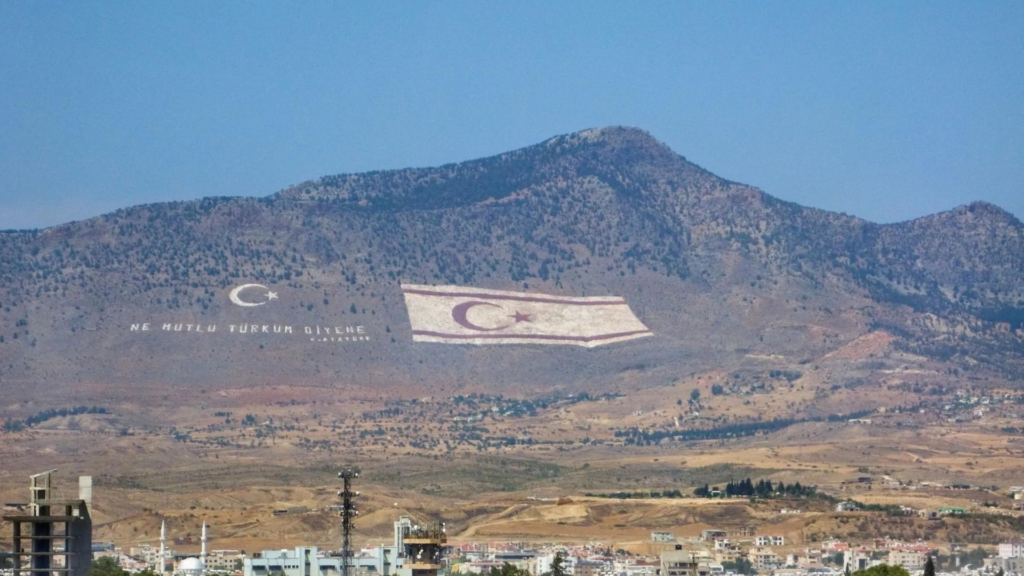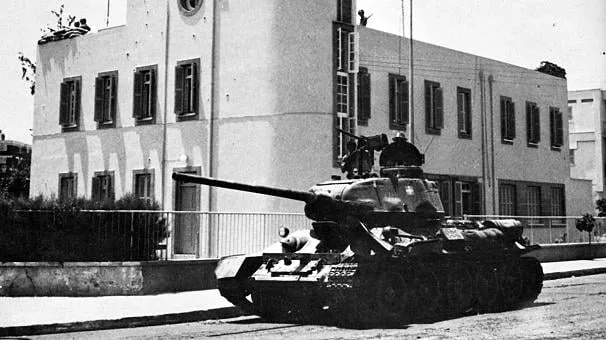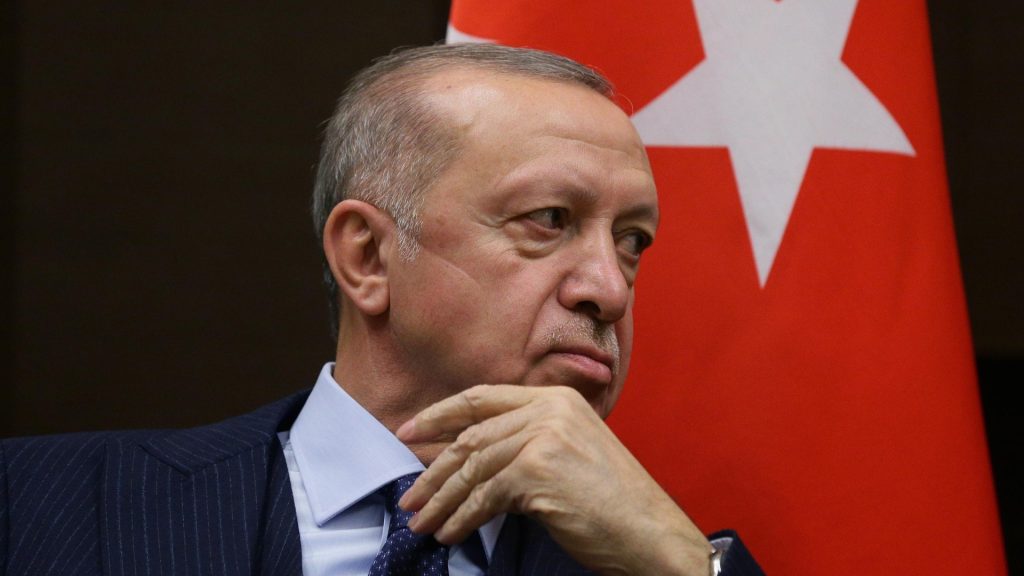By Dr Dimitri Gonis*
At the Ledra Palace check point in Nicosia, Cyprus stands a red and white sign that reads: ‘TURKISH REPUBLIC OF NORTHERN CYPRUS FOREVER.’ Not too far away, painted on the slopes of Mount Pentadaktylos, is a giant variation of the Turkish flag. Below it a quote by Kemal Ataturk declares: ‘Ne mutlu türk’üm diyene’ (How happy is he who calls himself a Turk).
Every evening thousands of bulbs light it up, sending a spiteful message to the vanquished Greek-Cypriots on the other side who can still see their old homes and those living in them.
Both signs and flags are painful reminders of the 20th of July-August 1974 when Turkish troops stormed the island, capturing 37 percent of its territory in the name of ‘peace.’ A ‘peace mission’ which left thousands of civilians dead, 165,000 Greek Cypriots and approximately 40,000 Turkish Cypriots, displaced out of a total population of 650,000.

The invasion of Cyprus was not a spontaneous or unplanned event, but rather an accumulation of almost a century of Turkish foreign policy and imperial nostalgia.
In 1878 the declining Ottoman Empire ceded Cyprus to Britain in exchange for protection from Russian aggression. This was generally viewed as a temporary decision, with Turkish diplomats often expressing the desire to have it returned to its ‘rightful owner’. In 1925 it became another British colony.
The island’s first constitution, in 1960, made Greece, Britan and Turkey its guarantors and accorded them the right to intervene together, or unilaterally, in order to restore the status quo, if that was ever threatened. It also ceded 99 square miles to Britain for its military assets.
Even though Greek-Cypriots had, by 1974, generally gotten over their obsession with enosis – union with Greece, which constituted much of the thrust of intercommunal conflict – ultra-nationalism still existed in certain circles both in Greece and Turkey which respectively saw Cyprus as an extension of their own domains.
Between 1967 and 1974, the junta in Athens regularly meddled in Cypriot affairs, financing nationalists in the Greek-Cypriot National Guard with the ultimate goal of annexing Cyprus. To them any potential impact on the Turkish-Cypriot community did not matter. They would simply be ‘collateral damage’ in one more of Hellas’ ‘great’ causes.
On 15 July 1974 the Greek-Cypriot National Guard launched a coup supported by the Greek junta. It included a failed attempt to assassinate the legitimate president of Cyprus and replace him with a more ‘cooperative’ patriot, the Turk-hater Nikos Sampson. The Greek junta had unleashed a disaster both communities would pay for.

On its part, Turkey viewed the junta’s actions as a direct threat to its own plans for the island, but also as a legitimate threat to the safety of its community. Five days later, it reacted by launching its so-called ‘peace mission’. But it was far from that.
Turkey has always maintained that it was acting lawfully and in accordance with the constitution which gave it the right to do so. That, had it not ‘intervened’ Turkish Cypriots would have been eliminated by Greek and Greek-Cypriot ultra-nationalists on the island.
The coup offered Turkey the perfect pretext to launch an invasion under the guise of constitutional duty; one that ostensibly sought to restore the political situation. In reality, it was the fulfillment of a long-held desire to possess a large section of Cyprus.
It did so by capturing 37% of territory for the 18% percent of Turkish Cypriots. A disproportionality which in itself speaks volumes about the insincerity of its claims.
For fifty years, Turkey has clung to the mantra, or rather mythology, of a humanitarian ‘peace mission’. The facts have shown that its intention was never the restoration of order or a humanitarian mission aiming to prevent the two communities from killing each other. Had it been so, it would have halted its actions and worked with the Greek-Cypriot side to restore the status quo. Instead, it launched a second invasion on the 14th of August 1974 while talks were underway in Geneva.
The second thrust into the island was more violent and effective. It included bombing of civilian targets, executions, the wholesale displacement of communities, rapes and the transferring of hundreds of Greek-Cypriot men to mainland Turkish prisons, to disappear forever. Once vibrant cities like Varosha, Famagusta, with a population of 40,000 were reduced to ghost towns while the rest of the world watched on.
In the years following its invasion, Turkey proceeded to openly defy international law by ethnically cleansing the occupied areas and importing settlers from its hinterland in order to alter the demographics and make any future effort to reunite the island very difficult. It then distributed the properties of the displaced Greek-Cypriots to the newcomers.
The political climate in the occupied areas has never really been conducive to a genuine solution despite the good will of many moderate Turkish-Cypriots like former leader Mustafa Akinci (2015-2020). Instead, one gets the feeling of a pervasive spite and vengeance. A bombastic cruelty of the ‘victors’ towards the vanquished in innuendos and snide remarks. One which is evident in the signs and flags, and in the determination with which millennia of Greek-Cypriot presence have been methodically destroyed.
The authoritarianism, toxic masculinity and hyper nationalism of Turkish politics has made it impossible to negotiate democratically and in a spirit of humanitarianism. As much as it might like to pretend it is, Turkey is not a democracy in the western sense. It plays by its own rules and imposes itself by force.
President Erdogan has made it very clear that the situation in Cyprus is the new reality and that ‘Turkey will be there forever’.

Ironically, the greatest threat to Turkish-Cypriotness today, is mainland Turkish nationalism. What is being ‘defended’ on Cyprus is Turkishness not Turkish-Cypriotness. The two are not the same thing.
The last attempt to reunite the island was the 2004 Anan Plan which was rejected by 75% of Greek-Cypriots and supported by 65% of Turkish-Cypriots. The Turkish side cited its failure as more proof of Greek-Cypriot intransigence and greed. For the Greek side, it was a perpetuation of the existing situation with no substantial gains. Hundreds of thousands of illegal settlers would stay. Turkey would remain a guarantor and its troops would be ‘gradually’ withdrawn.
The Anan Plan envisaged a united Cyprus as a member of the EU. Unfortunately, its implementation had been wedded to a particular time frame – May 2004. This hadn’t given the communities – the Greek-Cypriot community in particular – enough time to digest its content and thus adjust to a ‘new reality’.
Some had hoped that Cyprus’ entry into the EU would have been a game changer. That Turkey would have somehow caved under the pressure of having to negotiate with the entire bloc. But their naivete, or audacity, led them to underestimate its geopolitical and economic importance.
Turkey, a major trading partner of the EU and a buffer between Europe and the Middle East, was never going to be strong-armed. And no one was really prepared to upset it. Greek-Cypriots would have to endure more international indifference to their plight because the benefits of a united Cyprus of 1.2 million could not compare with the benefits of a friendly Turkey of 86 million.
This week marks fifty years since the invasion of Cyprus. 63% percent of the island will be mourning while the rest will be celebrating a crime against humanity; forgetting the faces and stories of those lost. There will be military parades and dignitaries from Turkey who will make pompous speeches and medieval threats to ‘break the hands’ of anyone who dares to challenge their country’s flag or might.
Turkey’s constant denial of its historical crimes against humanity will not make them go away. Its illegal invasion, and continued occupation of a sovereign state, is a blemish on its national character. It can easily remedy this by simply taking a back seat and allowing Turkish- and Greek-Cypriots to negotiate their own future. It can begin by withdrawing its troops immediately or continue being the eastern Mediterranean’s most belligerent and ever-whining bully.
*Dr Dimitri Gonis is a Melbourne-based writer.